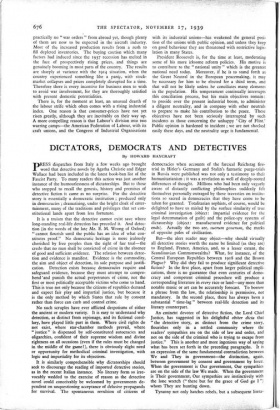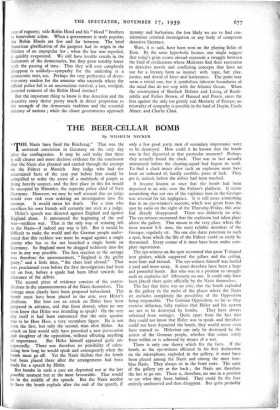DICTATORS, DEMOCRATS AND DETECTIVES
By HOWARD HAYCRAFT
DRESS dispatches from Italy a few weeks ago brought word that detective novels by Agatha Christie and Edgar Wallace had been included in the latest book-ban list of the Fascist Party. To many readers this action was just another instance of the humourlessness of dictatorships. But to those who stopped to recall the genesis, history and premises of detective fiction it came as no surprise. For the detective story is essentially a democratic institution ; produced only in democracies ; dramatising, under the bright cloak of enter- tainment, many of the traditions and privileges that set con- stitutional lands apart from less fortunate.
It is a truism that the detective cannot exist save where long-standing real-life detection has preceded it. And detec- tion (in the words of the late Mr. E. M. Wrong of Oxford) " cannot flourish until the public has an idea of what con- stitutes proof." No democratic heritage is more jealously cherished by free peoples than the right of fair trial—the credo that no man shall be convicted of crime in the absence of good and sufficient evidence. The relation between detec- tion and evidence is manifest. Evidence is the commodity, the aim and object of detection, its sole purpose and justifi- cation. Detection exists because democracies require and safeguard evidence, because they must attempt to compre- hend Sand punish the actual perpetrators of crime, not the first or most politically acceptable victims who come to hand. This is true not only because the citizens of republics demand and expect fair play and impartial justice, but because it is the only method by which States that rule by consent rather than force can curb and control crime.
No such scruples have ever afflicted despotisms of either the ancient or modern variety. It is easy to understand why detection, as distinct from espionage, and its fictional corol- lary, have played little part in them. Where civil rights do not exist, where star-chamber methods prevail, where " justice " is dispensed by self-constituted autocracies and oligarchies, confident of their supreme wisdom and divine rightness on all occasions (even if the rules must be changed in the middle of the game!), there is obviously slight need or opportunity for methodical criminal investigation, with logic and impartiality for its objectives.
It is similarly comprehensible why dictatorships should seek to discourage the reading of imported detective stories, as in the recent Italian instance. No literary form so irre- vocably wedded to the exercise of reason as the detective novel could conceivably be welcomed by governments de- pendent on unquestioning acceptance of delusive propaganda for survival. The spontaneous revulsion of citizens of democracies when accounts of the farcical Reichstag fire- trial in Hitler's Germany and Stalin's fantastic purge-trials in Russia were published was not only a testimony to their humanitarianism ; it was a revelation as well of deeply-rooted differences of thought. Millions who had been only vaguely aware of distantly conflicting philosophies suddenly felt themselves personally outraged by these travesties on institu- tions so sacred in democracies that they have come to be taken for granted. Totalitarian sophists, of course, would be delighted to have us misled by the surface similarity of true criminal investigation (object: impartial evidence for the legal determination of guilt) and the police-spy systems of dictatorship (object: manufactured evidence for political ends). Actually the two are, suorum genet-um, the marks of opposite poles of civilisation.
But—the alert reader may object—why should virtually all detective stories worth the name be limited (as they are) to England, France, America, and, to a lesser extent, the Scandinavian Commonwealths? What, for instance, of the Central European Republics between 1918 and the Brown Plague? Why did they fail to produce significant detective fiction? In the first place, apart from larger political impli- cations, there is no guarantee that even centuries of demo- cracy and competent criminal procedure will produce a corresponding literature in every race or land—any more than notable music or art can be accurately forecast. To borrow a phrase from the law, the relationship is permissive, not mandatory. In the second place, there has always been a substantial " time-lag " between real-life detection and its literary counterpart.
An eminent devotee of detective fiction, the Lord Chief justice, has suggested in his delightful obiter dicta that " the detective story, as distinct from the crime story, flourishes only in a settled community where the readers' sympathies are on the side of law and order, and not on the side of the criminal who is trying to escape from justice." This is another and more ingenious way of saying what has been set forth in the preceding paragraphs. It is an expression of the same fundamental contradiction between We and They in government—the distinction, again, between government by consent and government by force. When the government is Our government, Our sympathies are on the side of the law We made. When the government is Their government, Our sympathies are instinctively with the lone wretch (" there but for the grace of God go I ") whom They are hunting down.
Tyranny not only hatches rebels, but a subsequent litera- ture of roguery; vide Robin Hood and his " blood " brothers in benevolent crime. When a government is truly popular, the Robin Hoods are few and far between. The brief American glorification of the gangster had its origin in the lifetime of an unpopular law ; when the law was repealed, it quickly evaporated. We still have lovable rascals in the literatures of the democracies, but they grow notably fewer with the passing of time. That they will ever completely disappear is unlikely—sympathy for the underdog is a democratic trait, too. Perhaps the very preference of detec- tive-story readers for the amateur who succeeds where the official police fail is an unconscious survival, a last, vestigial, inverted remnant of the Robin Hood instinct!
But the important thing to know is that detection and the detective story thrive pretty much in direct proportion to the strength of the democratic tradition and the essential decency of nations ; while the closer governments approach tyranny and barbarism, the less likely we are to find con- scientious criminal investigation or any body of competent detective literature.
Wars, it is said, have been won on the playing fields of Eton. By the same hyperbolic licence, one might suggest that today's grim events abroad represent a struggle between the kind of civilisations whose Ministers find their recreation in detective novels and conflicting concepts that have no use for a literary form so instinct with logic, fair play, justice, and denial of force and lawlessness. The point may seem a trivial one, but it symbolises inherent boundaries of the mind that do not stop with the Atlantic Ocean. When the countrymen of Sherlock Holmes and Lecoq, of Roule- tabille and Father Brown, of Hanaud and Poirot, enter the lists against the only too grimly real Moriarty of Europe, no neutrality of sympathy is possible in the land of Dupin, Uncle Abner, and Charlie Chan.





































































 Previous page
Previous page